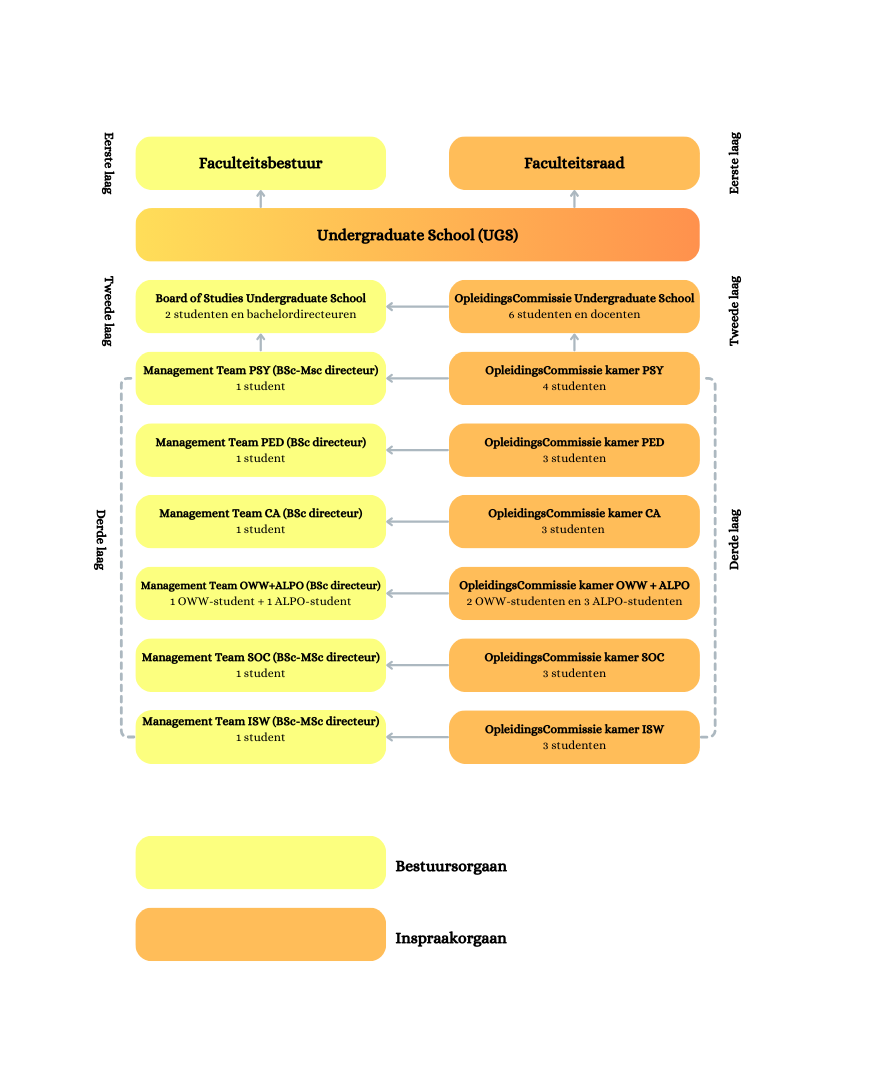General Structure
At the faculty, several Participation bodies are in place in which students represent their interests and monitor the quality of education. All Participation bodies consist of both students and staff members. Here, we will focus on the Participation bodies that deal with the quality of the individual bachelor’s programmes within the Faculty of Social and Behavioural Sciences.
To make the different layers of the Participation clear, you can find a visual representation here. This diagram shows the Bachelor Participation, but there is also an overview in which the entire Participation is displayed.
the Bachelor Participation, but there is also an overview in which the entire Participation is displayed.
There are governing bodies and Participation bodies. Governing bodies make the final decisions at both the faculty and programme level. Participation bodies provide advice, contribute ideas, and, in some situations, hold the right of consent.
The first layer consists of the Faculty Board and the Faculty Council. You can find more information about this on the page about faculty-wide Participation. Below this lies the second layer. The second layer consists of inter-programme bodies, where several students from the third layer meet with, among others, the bachelor’s directors. These are the Board of Studies Undergraduate School (BoS UGS) and the Programme Committee Undergraduate School (OC UGS).
The third layer consists of programme-specific Participation. Here you will find each layer that represents the programme, namely the Programme Committee groups and the Management Teams. Every programme is organized in the same way, except for Educational Sciences (OWW) and the Academic Teacher in Primary Schools Education programme (ALPO). These have both a Management Team member for OWW and a Coordination Team member for ALPO. This page will focus on this third and lowest layer.
Within your own bachelor’s programme, there are two Participation functions: that of Management Team member and that of Programme Committee member.
Management Team member (MT)
The student member of the Management Team (MT) is part of the governing body of the bachelor’s programme and has influence on the policy and organisation of the programme. In the MT meetings, the MT member discusses issues such as the course offerings, curriculum revisions, student well-being, and possible budget cuts, together with the programme director, course coordinators, and policy officers. As a representative of all students within the programme, it is important that the MT member stays informed about what is happening among fellow students. Therefore, MT members are in frequent contact with the student members of the Programme Committee, the study association, and, for example, the mentoring/tutoring programme.
Two of the MT members also represent the others in the Board of Studies meetings, where policy decisions are discussed with the faculty board. Staff representatives are also present in these meetings (more information about the BoS UGS can be found on the faculty Participation page [link]).
Note: within the Academic Teacher in Primary Schools Education (ALPO) programme, the MT member is referred to as a Coordination Team member (CT member), but the content and responsibilities of the role are largely the same.
Programme Committee group (OC-kamer)
The Programme Committee group (OC group) is the Participation body within the programme and monitors the programme board. The OC consists of 2 to 5 students (depending on the size of the programme) and a number of staff members. The main task of the OC is to discuss the quality of education, which includes reviewing course evaluations. As an OC member, students gather the opinions of fellow students, collect complaints, and provide advice on education-related matters.
If there are issues that affect multiple programmes within the faculty, these can be discussed in the Programme Committee Undergraduate School (OC UGS). In this committee, each bachelor’s programme is represented by one student and one staff member (more information about the OC UGS can be found on the faculty Participation page).
Other students working for your programme
In addition to the MT and OC functions, there are other students actively involved in the Participation and their programme.
The Contact Person Inspraak (CPI) is a representative of the board of the study association of a programme, often the education coordinator. This person is responsible for study-related activities and gathers opinions on courses within the study association. Although the CPI does not hold an official Participation function, they do attend programme meetings of the Participation. In this way, the CPI stays informed about education- and Participation-related matters within the programme and can pass this information back to the study association.
Faculty Council
In addition, there are seven Faculty Council members (FR), with each member linked to a specific programme. This means that every programme has a direct contact person within the Faculty Council, who can keep them informed about issues at the faculty level. The Programme Committees can also pass on important points through these FR members to the Faculty Council, ensuring that the interests of their programme are represented. Want to learn more about the FR? Check out the page about faculty-wide Participation.
Quickly check who is representing your programme this year!

